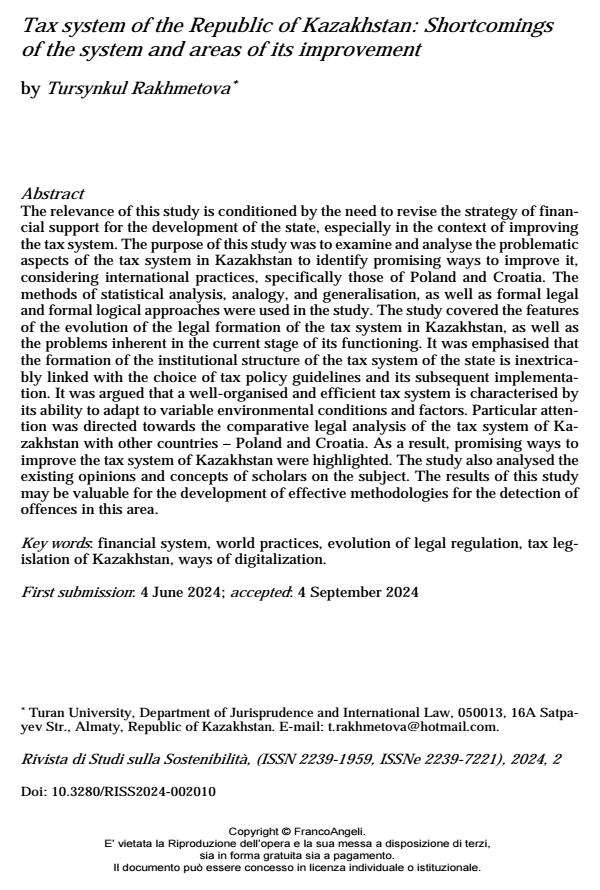Tax system of the Republic of Kazakhstan: Shortcomings of the system and areas of its improvement
Journal title RIVISTA DI STUDI SULLA SOSTENIBILITA'
Author/s Tursynkul Rakhmetova
Publishing Year 2024 Issue 2024/2
Language English Pages 19 P. 161-179 File size 214 KB
DOI 10.3280/RISS2024-002010
DOI is like a bar code for intellectual property: to have more infomation
click here
Below, you can see the article first page
If you want to buy this article in PDF format, you can do it, following the instructions to buy download credits

FrancoAngeli is member of Publishers International Linking Association, Inc (PILA), a not-for-profit association which run the CrossRef service enabling links to and from online scholarly content.
The relevance of this study is conditioned by the need to revise the strategy of fi-nancial support for the development of the state, especially in the context of im-proving the tax system. The purpose of this study was to examine and analyse the problematic aspects of the tax system in Kazakhstan to identify promising ways to improve it, considering international practices, specifically those of Poland and Croatia. The methods of statistical analysis, analogy, and generalisation, as well as formal legal and formal logical approaches were used in the study. The study cov-ered the features of the evolution of the legal formation of the tax system in Ka-zakhstan, as well as the problems inherent in the current stage of its functioning. It was emphasised that the formation of the institutional structure of the tax system of the state is inextricably linked with the choice of tax policy guidelines and its subsequent implementation. It was argued that a well-organised and efficient tax system is characterised by its ability to adapt to variable environmental conditions and factors. Particular attention was directed towards the comparative legal anal-ysis of the tax system of Kazakhstan with other countries – Poland and Croatia. As a result, promising ways to improve the tax system of Kazakhstan were high-lighted. The study also analysed the existing opinions and concepts of scholars on the subject. The results of this study may be valuable for the development of ef-fective methodologies for the detection of offences in this area.
Keywords: financial system, world practices, evolution of legal regulation, tax leg-islation of Kazakhstan, ways of digitalization.
Tursynkul Rakhmetova, Tax system of the Republic of Kazakhstan: Shortcomings of the system and areas of its improvement in "RIVISTA DI STUDI SULLA SOSTENIBILITA'" 2/2024, pp 161-179, DOI: 10.3280/RISS2024-002010